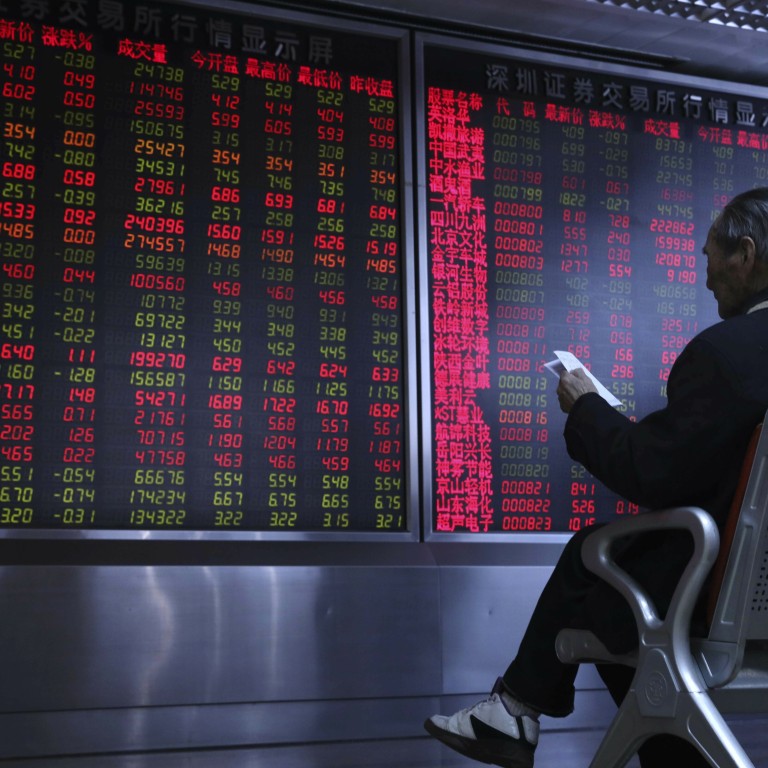
Shanghai bulls charge ahead, giving benchmark 2.7 per cent weekly gain
- The Shanghai Composite Index added 0.1 per cent, or 2.69 points, to 3,104.15 at the close, adding to a 2.7 per cent gain this week
China’s stocks rose on Friday, with the benchmark gauge capping a second weekly gain, as traders bet that the world-beating rally on the world’s biggest emerging market will carry on.
The Shanghai Composite Index added 0.1 per cent, or 2.69 points, to 3,104.15 at the close, adding to a 2.7 per cent gain this week. Hong Kong’s Hang Seng Index also rose slightly.
The mainland’s equity benchmark has eked out gains every week this year except one, rising 24 per cent this year as the world’s best-performing stock market, as the regulators loosened restrictions on equity trading and Beijing ratcheted up policy support to bolster economic growth.
Morgan Stanley reiterated in a Thursday report that the run-up in Chinese stocks still has legs, citing the limited impact of the regulatory crackdown on over-the-counter margin trading and more pro-growth measures such as cuts in tax rates and banks’ reserve requirement ratio. Its newly launched gauge of market sentiment showed the current reading was just half of what would foreshadow overheating.
“If the market rises at a slower pace going forward, the bull-run can last long,” said Wang Zheng, chief investment officer at Jingxi Investment Management in Shanghai. “But if it does at a very fast pace, the run-up may be short-lived because that’ll probably incur intervention from the regulators.”
Zhejiang Longsheng Group led chemical stocks higher on expectations an explosion in a chemical industrial park in the eastern province of Jiangsu will cause a strain supply and boost prices of related products. The blast, which occurred on Thursday, killed at least 47 people and injured 640 others. The accident also drew the attention from President Xi Jinping, who called for quick investigation and prevent of similar occurrences on his tour to visiting European countries.
Zhejiang Longsheng, which makes the same chemicals as the plant that caused the explosion in the park, surged by the 10 per cent daily limit to 12.56 yuan. Zhejiang Runtu, a dyer maker, also jumped by the daily limit to 13.02 yuan and Shanghai Anoky Group added 2.3 per cent to 6.71 yuan.
Citic Securities, the nation’s biggest publicly traded brokerage, slipped 0.4 per cent to 24.80 yuan in Shanghai after saying net income fell 18 per cent from a year earlier in 2018 on decreased commission fees amid a shake-out in the equity market.
In Hong Kong, the Hang Seng Index gained 0.1 per cent, or 41.80 points, to 29,113.36, while the Hang Seng China Enterprises Index, or the H-share gauge, retreated 0.2 per cent.
Tencent Holdings, the Chinese media juggernaut that has the biggest weighting on the Hang Seng Index, rose 0.6 per cent to HK$365. Full-year profit rose 10 per cent from a year earlier to 78.7 billion yuan (US$11.7 billion) in 2018, the company said on Thursday night.
Analysts’ readings of the results were mixed. While China International Capital Corp downgraded the rating on the stock to hold from buy, Huatai Financial was positive on the prospects of Tencent’s online advertisement business and CCB International was excited about its new initiatives in areas such industrial internet and cloud computing.
AAC Technologies Holdings rallied 3.5 per cent to HK$46.45 after the maker of components for smart phones and tablets posted a 29 per cent decline in 2018 net income. Still, the company said in the earnings report that it will benefit in the new growth cycle in the smartphone industry.

